What is Temporomandibular Joint Disorder?
Some refer to it as TMJ while others call it TMD. Regardless of the acronym used, Temporomandibular Joint Disorder (or Dysfunction) is a complex condition involving the joints on either side of your face just below your ears.
These highly specialized joints connect your lower jaw to your skull and are the only joints in the body that move in three directions—up and down, side to side, and front to back. When they function properly, you can speak and chew with ease and without facial pain. When dysfunction occurs, however, the result can be a wide range of painful symptoms affecting areas from your head down to your fingertips.
At our practice, we offer comprehensive dental care in Urbandale, which means not only addressing the health of your teeth and gums but also treating conditions like TMJ disorder that impact your overall comfort and quality of life.

TMJ Treatment Will Relieve Headaches
TMD is often misdiagnosed or missed completely because TMJ-related headaches (one of the most common TMJ symptoms) are extremely painful, and some of the other symptoms of TMJ resemble a condition known as Trigeminal Neuralgia.
The trigeminal nerves (again, we all have two of them) are the control center for the jaw and brain, and when the trigeminal nerves are overworked, migraines or migraine-like headaches may occur. If you are misdiagnosed with trigeminal neuralgia, your TMJ symptoms will likely get worse. Or, if you are treated for only the pain from your headaches, the TMJ problem will not be addressed. That’s why it’s crucial to find TMJ treatment with our Urbandale dentist.
TMJ Treatment in Des Moines
If you want to learn more about TMJ symptoms, please read our TMJ symptoms page, but here, we are going to focus on TMJ treatment because our Urbandale dentist has spent a good part of her career focusing on how to treat TMJ to help people get their lives back.
Many people with TMJ clench or grind their teeth (medically known as “bruxism). Many people don’t even know they’re doing this unless a partner calls it to their attention. Bruxism can cause extensive damage to your bite and your teeth because your teeth are constantly being overstressed and your temporomandibular joints are always tight and overworked.
Your TMJs control the movement of your jaw, and when distressed, the resulting jaw pain can include chronic jaw aches, headaches, migraines, and many other symptoms.
If you suffer from bruxism and/or TMJ disorder our dentist is able to design a nightguard to protect your teeth and jaw joints from damage. In addition, if you clench or grind at night and the muscles in your face hurt the next morning then you also be experiencing sleep disorder breathing, which can mean airway issues.

Types Of TMJ Treatment in Des Moines
Types Of TMJ Treatment
in Des Moines
At her Urbandale dental practice, Dr. Lawson takes a step-by-step approach to treating TMJ disorder, beginning with the most conservative therapies and moving toward long-term solutions when needed.
One of the first methods she may recommend is TENS (Transcutaneous Electric Nerve Stimulation). This is a non-invasive, pain-free therapy that uses small pulses of electricity delivered through pads placed on your face. These gentle impulses relax tight muscles and joints around your TMJs. Many patients feel relief within minutes, and because TENS is safe to use frequently, you may benefit from several short sessions each week. It’s an effective and time-efficient way to reduce pain without committing to more extensive procedures.
For patients who need additional support, Dr. Lawson may prescribe a custom-made oral appliance. Worn at night, this device gently positions your jaw to relieve stress on the joints while also preventing teeth grinding and clenching during sleep.
In many cases, she designs a more advanced version known as a neuromuscular TMD orthotic. Unlike a simple guard, this appliance is crafted using specialized diagnostics that measure how your jaw, muscles, and joints function together. By guiding the jaw into its most relaxed, balanced position, neuromuscular orthotics can reduce headaches, facial pain, and joint strain while improving long-term stability.
For patients seeking a permanent fix, Dr. Lawson may recommend a second phase of treatment. This can involve dental procedures such as orthodontics, crowns, veneers, or even dental implants to hold your jaw in the optimal position determined during the orthotic phase.
With the help of advanced TMJ technology that tracks your jaw movements and sounds, Dr. Lawson can pinpoint the exact source of your discomfort and recommend the treatment plan that fits both your symptoms and your lifestyle.
Learn More About
TMJ Treatment in Des Moines
Learn More About TMJ Treatment in Des Moines
Please call Lawson Dentistry today at (515) 278-4366 to set up a TMJ treatment appointment. You may also fill out our online contact form, and one of our dental team members will reach out to answer questions or schedule a new patient evaluation.





